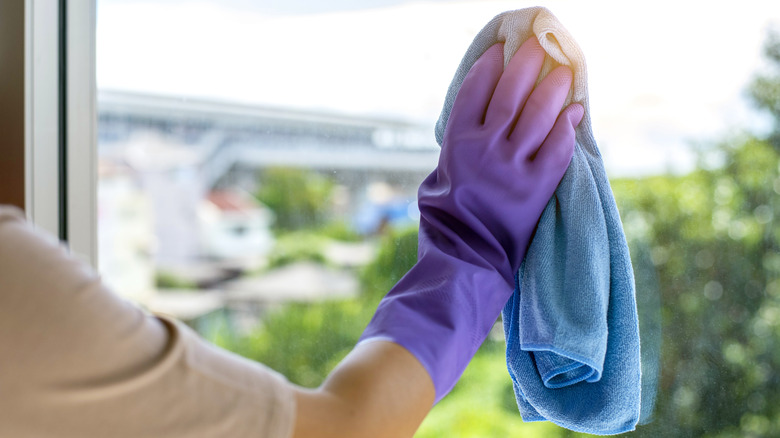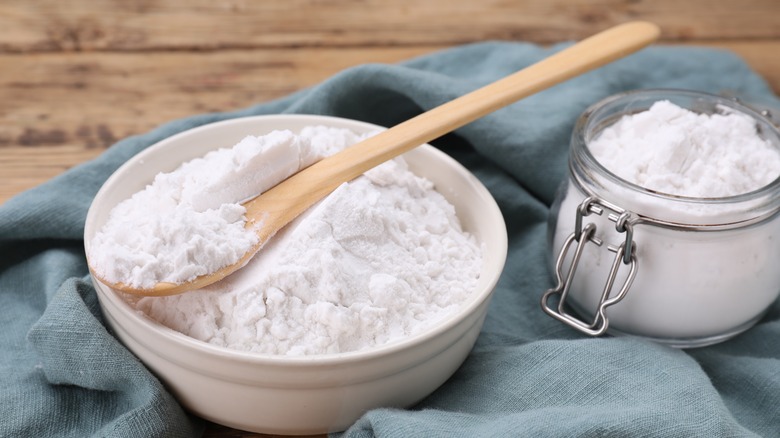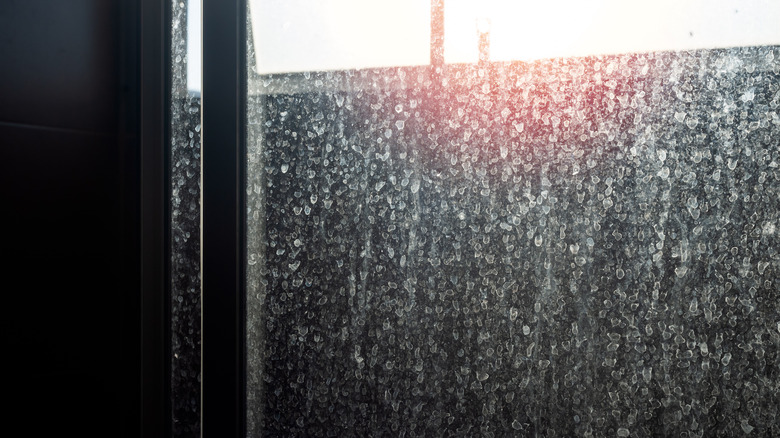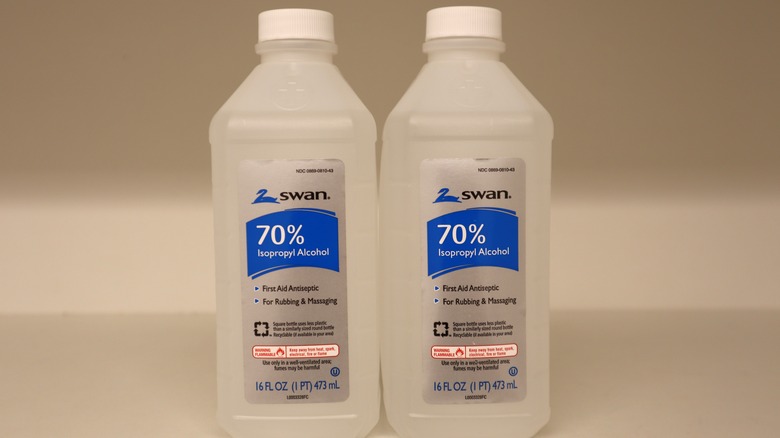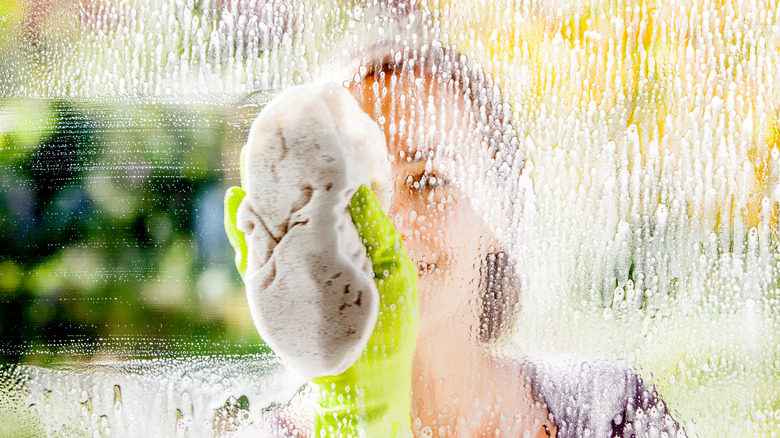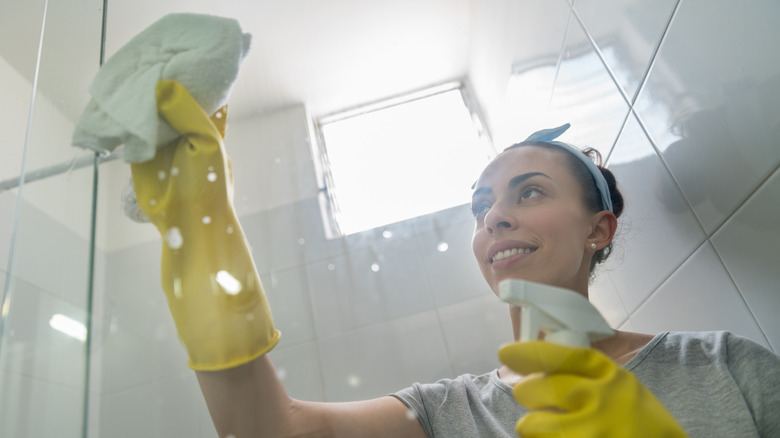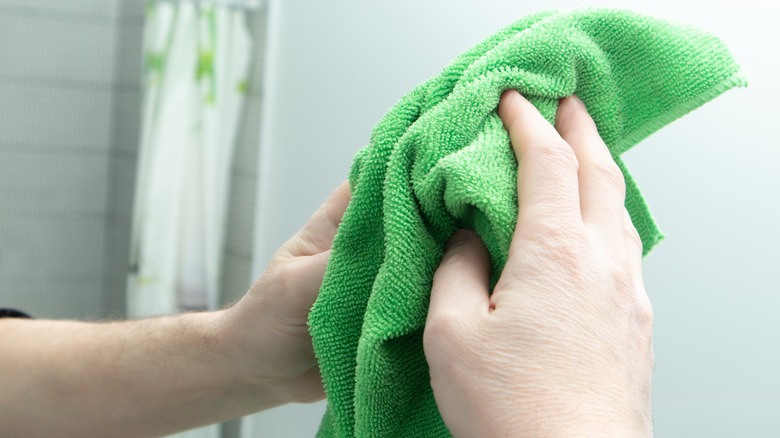6 Household Ingredients You Should Be Using To Clean The Glass In Your Home
When cleaning windows, mirrors, and any other glass surfaces around your home, you might be used to storebought products. However, you'll want to think twice about cleaning with Windex and other commercial glass cleaners. While seemingly harmless, the Environmental Working Group gave Windex a "D" grade due to its potential impacts on health and the environment. This is related to ingredients such as ammonium hydroxide, hexoxyethanol, and fragrances, which could potentially cause problems from skin irritation to respiratory problems to vision damage.
The good news is you don't have to rely on commercial cleaners in order to get glass clean and shiny. There are several alternatives to storebought glass cleaners, and you might already have some of them in your pantry or cleaning cabinet. Not only might these be safer, but they can also help save money in the process and come in handy if you need to clean glass in a pinch. Here is a closer look at all the household ingredients you can use to get your windows streak-free.
Cornstarch can help absorb dirt and clean grime from glass surfaces
Cornstarch is one ingredient you can use in a DIY glass cleaner to help absorb and gently scrub away caked-on dirt and grime. In fact, it's thought that this kitchen ingredient will leave glass surfaces in your home clean and shiny. First, combine 1 tablespoon of cornstarch with ¼ cup of white vinegar and 4 cups of warm water. Then, place your newly created natural cleaner in a spray bottle for easy use on a variety of glass surfaces, including windows, mirrors, and stovetops. Use it liberally as you would with a commercial glass cleaner, and thoroughly wipe the product away with a soft, clean cloth. Repeat if necessary.
Often used in cooking as a thickening agent, this common kitchen staple is relied on for its ability to soak up liquids. Because of this, it can be used to absorb stains on glass surfaces. It's also mildly abrasive, which can help scrub surfaces and loosen dirt and grime from the glass. However, the powdery ingredient alone can't be used to clean. This is why you'll need to combine cornstarch with an acid and water to create a glass cleaning paste.
White vinegar will help remove water stains from windows and glass
White vinegar is another ingredient that is said to help clean a variety of surfaces in your home, including glass. In fact, vinegar may even be the secret to cleaning windows thanks to its acidic nature. Simply combine 3 tablespoons of white vinegar with 4 cups of warm water in a spray bottle for an easy mirror and glass cleaner. However, if it has been some time since you last washed your windows and require a bit more muscle power, turbocharge the formula with ammonia. Mix 1 tablespoon ammonia and 1 tablespoon vinegar with 1 quart water. Having two acidic ingredients will help cut through the grime and buildup easier.
If you're skeptical about giving up commercial glass cleaner for recipes containing vinegar, know that white vinegar may be just as effective without the harmful effects on human health. Since it's an acid, vinegar is strong enough to eat away at hard water stains and mineral buildup, but gentle enough to use on a variety of surfaces such as glass. As a bonus, vinegar can even help remove germs from common surfaces throughout your home.
Rubbing alcohol can remove oil and grime from glass
Rubbing alcohol is another ingredient that can help break down materials on glass surfaces, and it can be especially effective against oil and grime stuck on windows or glass stovetops. To create a glass cleaner, mix together ¼ cup of rubbing alcohol along with 1 tablespoon of cornstarch, ¼ cup vinegar, and 2 cups of warm water. Place the ingredients in a spray bottle for easy use on windows, mirrors, furniture, and other glass surfaces in your home. Just be sure to shake the bottle thoroughly before use in case the cornstarch settles to the bottom.
The key to rubbing alcohol's effectiveness in cleaning glass is its main component, isopropyl alcohol. This powerful ingredient not only kills germs but also acts as a solvent, breaking down molecules upon contact. Whereas water alone can't dissolve oil and grime, isopropyl alcohol can. Another added benefit of washing your windows with rubbing alcohol is the evaporation rate of isopropyl alcohol. Since it dissolves so quickly, it minimizes the risk of streaks, which form when a cleaning solution lingers on a surface for too long. In fact, that's why many store-bought glass cleaners include isopropyl alcohol on their ingredient lists.
Liquid detergent can help clean dirty exterior windows
Liquid soap can be used for a variety of cleaning purposes. When it comes to tackling dirty exterior windows, however, you might give liquid detergent a try before buying chemical-based window-washing products. A simple recipe to keep windows sparkling involves mixing together 1 tablespoon liquid detergent and 4 cups of water. For particularly dirty windows, combine ½ teaspoon of liquid detergent with 3 tablespoons of vinegar and 2 cups of water in a spray bottle. The addition of vinegar aids in breaking down stubborn dirt. Rinse the solution with clean water for a pristine finish.
If you're on the fence about using liquid detergents for cleaning windows, it's worth understanding how they might work. Generally speaking, a detergent contains surfactants that have the ability to grab and stick to grime. The surfactants adhere to dirt better than the dirt sticks to the surface, so when you introduce water into the mix, they get wiped away. This effectively cleans the surface. However, if you're dealing with something trickier to break down — such as body oil on shower glass or mineral buildup on an exterior window — you might need to introduce an acid such as vinegar to help dissolve it first. Then, the soap can sweep away the loosened debris.
Hydrogen peroxide is a streak-free way to remove dirt from glass
Hydrogen peroxide is a great tool to clean windows inside and out. This medicine cabinet ingredient isn't as acidic as vinegar, but it can still leave your windows sparkling clean thanks to its ability to remove dirt. Unlike other methods in this roundup, you don't necessarily have to combine hydrogen peroxide with other pantry ingredients to clean windows. Simply add it to a spray bottle and use the product as you would a commercial glass cleaner. For best results, wipe away with a newspaper or microfiber towel.
When considering hydrogen peroxide for window cleaning, this method may work because of the natural oxidizing capabilities that allow the liquid to bubble up on contact and break down dirt. Plus, the typical 3% hydrogen peroxide product you can buy at drugstores is also an effective sanitizer that can be used to clean germs. In theory, this could mean hydrogen peroxide might also sanitize other glass surfaces, such as those in bathrooms. Keep in mind that you'll want to think twice before combining bleach with hydrogen peroxide, as this can create a dangerous and even deadly gas.
Use lemon juice as both a glass cleaner and a fragrance
Like vinegar, lemon juice is another acidic ingredient that's often used for a variety of home cleaning purposes. When it comes to glass surfaces, however, lemon can act as both a cleaning agent and a natural clean-smelling fragrance. For a simple glass cleaning recipe, combine 4 cups of water with 1 tablespoon of lemon juice. Once you have a spray bottle ready with this combination, feel free to use it on mirrors and windows and wipe the solution with a soft, dry cloth. This lemon hack may even be used on your glass shower door.
Thanks to its acidity, lemon juice is a powerful cleaning agent that canbreak down a variety of minerals, dirt, and rust. For showers and windows, lemon can also help remove hard water stains. But its benefits don't stop there. Lemon also acts as a natural disinfectant, effectively reducing the amount of germs and bacteria on the glass. This could be especially beneficial in the bathroom, where there is a greater emphasis on sanitizing. And let's not forget its deodorizing properties, which can leave your home smelling extra clean after use, adding a touch of natural freshness to your routine.
